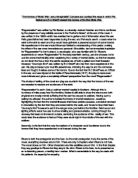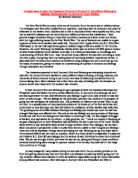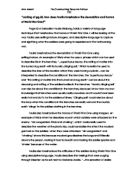Rivers is both the protagonist and the hero. As the main protagonist, he is the centre of the novel, everything revolves around him. There are only 3 chapters when Rivers is not here. The novel closes on him. Other characters are like satellites around him. In the final chapter, they say goodbye to Rivers but they stay in his mind. Rivers is the hero, he is presented as an outstanding person, a terribly hard-worker. What is remarkable is the way he deals with his patients: his capacity for empathy.
Another secondary character, which shows how good Rivers is Yealland. Both are psychiatrists.
Yealland is the anti-hero, the villain without any humanity. He is introduced not only because he really existed but because he is necessary to show the contrast between Rivers and himself.
In contrast, Stanhope is presented as a former schoolboy hero who used to be worshipped by Raleigh.
"He was skipper of rugger at Barford, and kept wicket for the eleven. A jolly good bat too." "I was frightfully keen to get into Dennis's Regiment." However his alcoholism and cowardice changes the audiences mind about his heroics.
At the beginning, Rivers has a very clear cut attitude: the soldiers must go back to the front when they have recovered from their circumstances. “It is his duty". "Duty" is a very important word for Rivers. But his belief will be undermined with the experience of his patients. Rivers gradually uses stronger and stronger words to express his horror at the war. This change is obvious in the chapter where Rivers looks for Burns: p.180: "nothing justifies this. Nothing, nothing, nothing." The italics show emphasis, underlying the key moment in which River’s attitude changes towards the war. This transformation is one that Barker wants readers to further investigate and realise a man did not have to physically experience the war, in order to be changed by it. Rivers is a character that the reader can relate to and see the horror of the war through the eyes off. Barker portrays the experience of severe traumatic stress principally through the interactions between several soldiers and their physician, Rivers.
Stanhope's idea of duty and honour can be clearly seen in the confrontation with Hibbert in Act 2.
"I must go into hospital and have some kind of treatment."
(quietly) "You're going to stay here" "You're going to stay here and see it through with the rest of us" "If you went, I'd have you shot- for deserting" A menacing character is brought out here who is emotionless.
The novel is written in a style which makes it look as if it is historically accurate by the inclusion of real people, facts and events. This is what makes the underlying message of the novel even more chilling. The main point of view of "Regeneration" is an omniscient narrator, however shifting the perspective from character to character is a tool used by the novelist to gain the reader's empathy as they relate the horrific and traumatic experiences that were brought about in the war.
The narrative allows the readers to delve into the minds of the characters, and feel empathy. Either in indirect style or, quite frequently, in free indirect style reduces the distance between the reader and the characters. The reader is placed within the characters' mind.
The use of indirect characterization relies heavily on speech. When they talk about war, we learn more about them than about war. The dialogue between Sassoon and Owen, in page 83 chapter 8, deals with war but the way they talk is extremely subjective.
"At night you could get the sense of something ancient. As if the trenches had always been there."
Realistic writing likes to insist on things that are disagreeable and wants to show reality as it is. Pat Barker gives the reader lots of details about life in the trenches:
"It was flooded. You stand the whole time. Most of the time in pitch darkness because the blast kept blowing the candles out. We were packed in so tight we couldn't move. And they just went all out to get us. One shell after the other. I lost two sentries. Direct hit on the steps. Couldn't find a thing." "And you had forty-eight hours of that ?" "Fifty. The relieving officer wasn't in a hurry." (p52)
"Your watch is brought back by a runner, having been synchronized at headquarters." A long pause. "You wait, you try to calm down anybody who's obviously shitting himself or on the verge of throwing up. You hope you won't do either of those things yourself. Then you start the countdown: ten, nine, eight... so on. You blow the whistle. You climb the ladder. Then you double through a gap in the wire, lie flat, wait for somebody else to get out - and then you stand up. And you start walking. Not at the double. Normal walking speed." Prior started to smile. "In a straight line. Across open country. In broad daylight. Towards a line of machine-guns." (p78)
There is no commentary at all. All we have is action. There is no attempt at hiding reality or making any details anymore palatable for the reader. Prior says it as it is. It is clearly opposed to propaganda, where soldiers are always presented as great heroes.
Gaps are left in the character’s flashbacks. This is another tool used by Barker; the reader must use their own imagination to fill those gaps. The novel becomes more interactive and adds emphasis to the horror of the war.
It is the landscape of war throughout the testimony of the patients and more especially trench warfare. "Regeneration" insists on the presence of corpses, mud and rats.
Many elements were added purposefully to create a whole universe of death and hostility. Pat Barker makes the reader perceive things as the characters perceive them: the reader should feel like the characters. The scene is seen through their eyes, with death in their head: they see death everywhere.
"Journey's End’s only narrative can be seen in the stage directions which are very descriptive and graphic.
"The voices grow nearer; two figures appear in the trench above and grope down the steps..."
"Towards dawn the candles are no longer burning. The intense darkness of the dugout is softened by the glow of the Very lights in the sky beyond the doorway.
"Regeneration" fails to include any areas of comedy as it has the monotone of being blunt.
"Journey's End" on the other hand includes comic relief in a few areas to bring the tension of the play down after climatic periods. This reduces the seriousness of the play.
"I'm glad you like it fat, sir.
"Well I like a bit o' lean, too.
"There was a bit of lean in the middle of yours, sir, but it’s kind of shrunk up in the cooking."
"Bad cooking, that's all"
Consequences of the war can be seen in all of the patients at Craig Lockhart hospital. Throughout "Regeneration", there is an insistence on physical suffering as well as on mental suffering, which is the major aspect of the novel. The symptoms have been studied by doctors and are historically genuine. Several soldiers have twitching of the head -spasmodic movement, stammering, and anorexia. Some suffer mutism or have mental paralysis, hallucinations, terrible nightmares or phobias.
Sassoon suffers from hallucinations and nightmares.
"Well that doesn't prove me insane" " And the hallucinations? The corpses in Piccadilly?"
"So I used to see..." "Corpses. Men with half their heads shot off, crawling across the floor"
Prior and Callan both suffer different levels of mutism. Barker uses these two characters to differentiate between two methods of treatment. Rivers treats Prior through visiting his memories and experiences. "If you feel you can't talk about France would it help to talk about the nightmares?"
"We were packed in so tight we couldn't move. And they just went all out to get us."
In contrast Dr Yealland treats Callan through electro shock therapy
"You are now ready for the next stage of the treatment, which consists of the administration of strong shocks to the outside of the neck. These will be transmitted to your voice box and you will soon be able to say anything you like in a whisper"
Anderson, a former war surgeon suffers from the phobia of blood.
"What in particular do you find difficult?"
"Blood"
Similarly, "Journey's End" shows how the war has caused mental blocks such as cowardice and alcoholism. Also there are signs of psychological damage and nerve damage similar to "Regeneration". Alcoholism and cowardice is shown in Stanhope's character.
"Clean trenches up - with little dustpan and brush. (He laughs.) Make you little apron - with lace on it." Act 1. The break up in speech shows his drunken behaviour and how child like he has become.
"She is waiting for me - and she doesn't know. She thinks I'm a wonderful chap - commanding a company... She doesn't know that if I went up those steps without being doped with whisky I’d go mad with fright." - Act 1. Making the protagonist of the play cowardly, shows that the war must have been horrific to make such a strong character so fearful.
There is evidence of both psychological damage and cowardice in the character of Hibbert.
"Every sound up there makes me cold and sick." "I can’t bear it any longer." Act 2 Scene 2
Sheriff chooses to kill-off the character of Raleigh, although he is such a young soldier who has only been in the army for a week. This can be interpreted as the underplaying message of the play, that innocent people are dying.
Stage directions at the end of act three is symbolic, coda is used.
"The whine of a shell rises to a shriek and bursts on the dugout roof. The shock stabs out the candle-flame." The candle here represents life and the extinction of it if wars go on.
In the final chapters of "Regeneration", Rivers reflects upon the existence of certainty and control. All of his life he was bound by abstract concepts such as duty and honour. Though these rules of gentlemanly behaviour always worked for him before, in the chaos and horror of war he is forced to bring them into question. The military and the government in time of war work by basing their decisions upon certainties: "it is wrong to shirk your war duty," "it is right to sacrifice for your country," and "it is wrong to undermine the cause by publicly disagreeing with the war." By insisting upon these certainties, the government controls the minds and actions of men. Much like Dr. Yealland, it uses its arms and branches in this case Rivers to force submission.
Yet, after years of working with shell-shock cases at Craiglockhart, Rivers is forced to confront the true definition of madness. Is Sassoon mad for rebelling unwisely against the war? Or is Rivers the one who is truly crazy? He is the one who works to heal people with the sole aim of returning "cured" patients to service, where they only face death. Rivers is forced to consider that he might be mad for working to defend a state that could sacrifice its own children so mercilessly. The questions of right and wrong, duty and honour are mingled and confused in the chaos of war in both texts.







